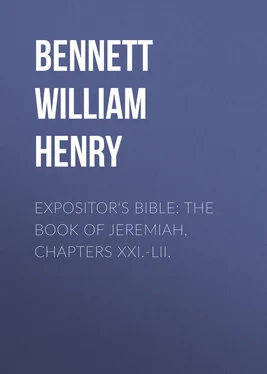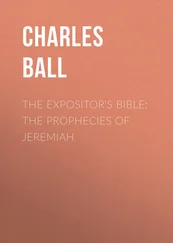William Bennett - Expositor's Bible - The Book of Jeremiah, Chapters XXI.-LII.
Здесь есть возможность читать онлайн «William Bennett - Expositor's Bible - The Book of Jeremiah, Chapters XXI.-LII.» — ознакомительный отрывок электронной книги совершенно бесплатно, а после прочтения отрывка купить полную версию. В некоторых случаях можно слушать аудио, скачать через торрент в формате fb2 и присутствует краткое содержание. Издательство: Иностранный паблик, Жанр: foreign_religion, foreign_antique, foreign_prose, на английском языке. Описание произведения, (предисловие) а так же отзывы посетителей доступны на портале библиотеки ЛибКат.
- Название:Expositor's Bible: The Book of Jeremiah, Chapters XXI.-LII.
- Автор:
- Издательство:Иностранный паблик
- Жанр:
- Год:неизвестен
- ISBN:нет данных
- Рейтинг книги:5 / 5. Голосов: 1
-
Избранное:Добавить в избранное
- Отзывы:
-
Ваша оценка:
- 100
- 1
- 2
- 3
- 4
- 5
Expositor's Bible: The Book of Jeremiah, Chapters XXI.-LII.: краткое содержание, описание и аннотация
Предлагаем к чтению аннотацию, описание, краткое содержание или предисловие (зависит от того, что написал сам автор книги «Expositor's Bible: The Book of Jeremiah, Chapters XXI.-LII.»). Если вы не нашли необходимую информацию о книге — напишите в комментариях, мы постараемся отыскать её.
Expositor's Bible: The Book of Jeremiah, Chapters XXI.-LII. — читать онлайн ознакомительный отрывок
Ниже представлен текст книги, разбитый по страницам. Система сохранения места последней прочитанной страницы, позволяет с удобством читать онлайн бесплатно книгу «Expositor's Bible: The Book of Jeremiah, Chapters XXI.-LII.», без необходимости каждый раз заново искать на чём Вы остановились. Поставьте закладку, и сможете в любой момент перейти на страницу, на которой закончили чтение.
Интервал:
Закладка:
The princes were well aware that the prophet's action would probably be resented and punished by Jehoiakim. They said to Baruch: "Do you and Jeremiah go and hide yourselves, and let no one know where you are." They kept the roll and laid it up in Elishama's room; then they went to the king. They found him in his winter room, in the inner court of the palace, sitting in front of a brasier of burning charcoal. On this fast-day the king's mind might well be careful and troubled, as he meditated on the kind of treatment that he, the nominee of Pharaoh Necho, was likely to receive from Nebuchadnezzar. We cannot tell whether he contemplated resistance or had already resolved to submit to the conqueror. In either case he would wish to act on his own initiative, and might be anxious lest a Chaldean party should get the upper hand in Jerusalem and surrender him and the city to the invader.
When the princes entered, their number and their manner would at once indicate to him that their errand was both serious and disagreeable. He seems to have listened in silence while they made their report of the incident at the door of Gemariah's chamber and their own interview with Baruch. 42 42 The A.V. and R.V. "all the words" is misleading: it should rather be "everything"; the princes did not recite all the contents of the roll.
The king sent for the roll by Jehudi, who had accompanied the princes into the presence chamber; and on his return the same serviceable official read its contents before Jehoiakim and the princes, whose number was now augmented by the nobles in attendance upon the king. Jehudi had had the advantage of hearing Baruch read the roll, but ancient Hebrew manuscripts were not easy to decipher, and probably Jehudi stumbled somewhat; altogether the reading of prophecies by a court-usher would not be a very edifying performance, or very gratifying to Jeremiah's friends. Jehoiakim treated the matter with deliberate and ostentatious contempt. At the end of every three or four columns, 43 43 The English tenses "cut," "cast," are ambiguous, but the Hebrew implies that the "cutting" and "casting on the fire" were repeated again and again.
he put out his hand for the roll, cut away the portion that had been read, and threw it on the fire; then he handed the remainder back to Jehudi, and the reading was resumed till the king thought fit to repeat the process. It at once appeared that the audience was divided into two parties. When Gemariah's father, Shaphan, had read Deuteronomy to Josiah, the king rent his clothes; but now the writer tells us, half aghast, that neither Jehoiakim nor any of his servants were afraid or rent their clothes, but the audience, including doubtless both court officials and some of the princes, looked on with calm indifference. Not so the princes who had been present at Baruch's reading: they had probably induced him to leave the roll with them, by promising that it should be kept safely; they had tried to keep it out of the king's hands by leaving it in Elishama's room, and now they made another attempt to save it from destruction. They entreated Jehoiakim to refrain from open and insolent defiance of a prophet who might after all be speaking in the name of Jehovah. But the king persevered. The alternate reading and burning went on; the unfortunate usher's fluency and clearness would not be improved by the extraordinary conditions under which he had to read; and we may well suppose that the concluding columns were hurried over in a somewhat perfunctory fashion, if they were read at all. As soon as the last shred of parchment was shrivelling on the charcoal, Jehoiakim commanded three of his officers 44 44 One is called Jerahmeel the son of Hammelech (A.V.), or "the king's son" (R.V.); if the latter is correct we must understand merely a prince of the blood-royal and not a son of Jehoiakim, who was only thirty.
to arrest Jeremiah and Baruch. But they had taken the advice of the princes and were not to be found: "Jehovah hid them."
Thus the career of Baruch's roll was summarily cut short. But it had done its work; it had been read on three separate occasions, first before the people, then before the princes, and last of all before the king and his court. If Jeremiah had appeared in person, he might have been at once arrested, and put to death like Uriah. No doubt this threefold recital was, on the whole, a failure; Jeremiah's party among the princes had listened with anxious deference, but the appeal had been received by the people with indifference and by the king with contempt. Nevertheless it must have strengthened individuals in the true faith, and it had proclaimed afresh that the religion of Jehovah gave no sanction to the policy of Jehoiakim: the ruin of Judah would be a proof of the sovereignty of Jehovah and not of His impotence. But probably this incident had more immediate influence over the king than we might at first sight suppose. When Nebuchadnezzar arrived in Palestine, Jehoiakim submitted to him, a policy entirely in accordance with the views of Jeremiah. We may well believe that the experiences of this fast-day had strengthened the hands of the prophet's friends, and cooled the enthusiasm of the court for more desperate and adventurous courses. Every year's respite for Judah fostered the growth of the true religion of Jehovah.
The sequel showed how much more prudent it was to risk the existence of a roll rather than the life of a prophet. Jeremiah was only encouraged to persevere. By the Divine command, he dictated his prophecies afresh to Baruch, adding besides unto them many like words. Possibly other copies were made of the whole or parts of this roll, and were secretly circulated, read, and talked about. We are not told whether Jehoiakim ever heard this new roll; but, as one of the many like things added to the older prophecies was a terrible personal condemnation of the king, 45 45 For verses 29-31 see Chap. VI ., where they are dealt with in connection with xxii. 13-19.
we may be sure that he was not allowed to remain in ignorance, at any rate, of this portion of it.
The second roll was, doubtless, one of the main sources of our present Book of Jeremiah, and the narrative of this chapter is of considerable importance for Old Testament criticism. It shows that a prophetic book may not go back to any prophetic autograph at all; its most original sources may be manuscripts written at the prophet's dictation, and liable to all the errors which are apt to creep into the most faithful work of an amanuensis. It shows further that, even when a prophet's utterances were written down during his lifetime, the manuscript may contain only his recollections 46 46 The supposition that Jeremiah had written notes of previous prophecies is not an impossible one, but it is a pure conjecture.
of what he said years before, and that these might be either expanded or abbreviated, sometimes even unconsciously modified, in the light of subsequent events. Verse 32 shows that Jeremiah did not hesitate to add to the record of his former prophecies "many like words": there is no reason to suppose that these were all contained in an appendix; they would often take the form of annotations.
The important part played by Baruch as Jeremiah's secretary and representative must have invested him with full authority to speak for his master and expound his views; such authority points to Baruch as the natural editor of our present book, which is virtually the "Life and Writings" of the prophet. The last words of our chapter are ambiguous, perhaps intentionally. They simply state that many like words were added, and do not say by whom; they might even include additions made later on by Baruch from his own reminiscences.
In conclusion, we may notice that both the first and second copies of the roll were written by the direct Divine command, just as in the Hexateuch and the Book of Samuel we read of Moses, Joshua, and Samuel committing certain matters to writing at the bidding of Jehovah. We have here the recognition of the inspiration of the scribe, as ancillary to that of the prophet. Jehovah not only gives His word to His servants, but watches over its preservation and transmission. 47 47 Cf. Orelli, in loco .
But there is no inspiration to write any new revelation: the spoken word, the consecrated life, are inspired; the book is only a record of inspired speech and action.
Интервал:
Закладка:
Похожие книги на «Expositor's Bible: The Book of Jeremiah, Chapters XXI.-LII.»
Представляем Вашему вниманию похожие книги на «Expositor's Bible: The Book of Jeremiah, Chapters XXI.-LII.» списком для выбора. Мы отобрали схожую по названию и смыслу литературу в надежде предоставить читателям больше вариантов отыскать новые, интересные, ещё непрочитанные произведения.
Обсуждение, отзывы о книге «Expositor's Bible: The Book of Jeremiah, Chapters XXI.-LII.» и просто собственные мнения читателей. Оставьте ваши комментарии, напишите, что Вы думаете о произведении, его смысле или главных героях. Укажите что конкретно понравилось, а что нет, и почему Вы так считаете.












